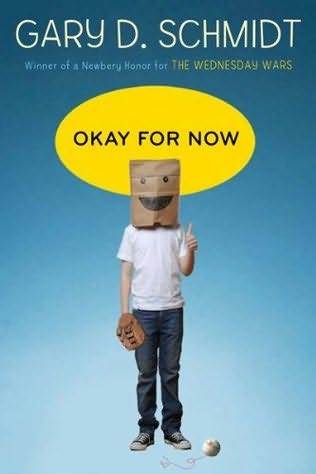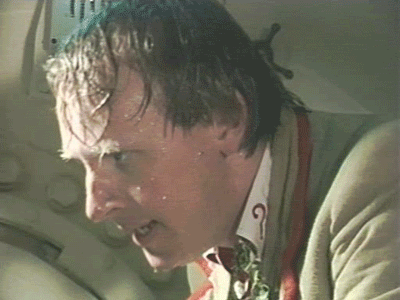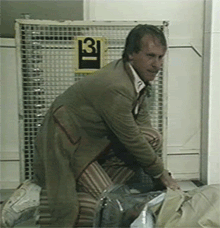Librarian in the TARDIS, Review 5.02
Title: The Kingmaker
Written by: Nev Fountain
Team TARDIS: Fifth Doctor, Peri, Erimem
Range and Number: Big Finish Main Range, #81
Release Date: April 2006
Synopsis (from TARDIS Wikia) -
Dr Who encounters one of the most notorious characters from the past as he journeys through time to solve the great Historical Mysteries...
Not surprisingly, the Doctor becomes mixed up with Richard III himself as he tries to unravel the perplexing problem of who exactly killed the princes in the Tower.
Peri and Erimem also encounter a suspicious time traveller. Someone from the Doctor's own past. Someone who shouldn't really be there at all.
So who did murder the princes in the Tower? Perhaps it's best not to ask a question like that...
You might not like the answer...
My Review:
Did you happen to notice the TARDIS Wiki synopsis for this story refers to the Doctor as “Dr. Who?” There is a very good reason for that. One that I’ll get to in a minute. But first, some background.
This was one of the first (if not the very first) Big Finish audios I ever listened to. I couldn’t tell you why I picked this one other than I’d recently finished up all of the Fifth Doctor’s TV stories and was feeling slightly depressed because I’d grown so attached to Fivey (it’s only gotten worse in the intervening years) and I wanted more of his stories. And, for whatever reason, I zeroed in on “The Kingmaker” to give me my Celery-Boy fix.
And, honestly, I could not have picked a better story.
The story starts in sixteenth-century London with Peri and original-to-Big-Finish-companion Erimem taking in the local cultural flavor in the form of Shakespeare’s Richard III. There are some brilliant and hilarious moments of culture clash because Peri accidentally spoils the ending of the play for the crowd and Erimem (a princess from ancient Egypt who came thisclose to being crowned Pharaoh) knows how to take care of lustful pigs who try to grab her bottom (her penchant for breaking arms becomes a delightful running gag throughout the story). Peri and Erimem wonder about the mystery of who killed Richard III’s nephews. Shakespeare, of course, asserts that Richard did it in order to become king.
Just a quick word on history and literature in this context - my college Shakespeare class spent a unit on Richard III and we discussed endlessly whether Richard really was this venomous, evil little troll who killed his nephews in order to secure the crown or if Shakespeare was just engaging in propaganda because anything that made Gloucester look bad made the Tudors (as in Queen Elizabeth I’s family) look good. Of course, as with any discussion in a college-level humanities course, there were never any definitive answers - only broad, disinterested speculation. And honestly, probably no one really knows and even fewer people care (just like all those missing episode rumors that a certain beclowned website keeps peddling even though the rest of us are well and truly sick of it).
(Sorry - tangented in the parentheticals there... now where was I?)
Actually, Richard comes off pretty good in this story. By no means is this story meant to be taken seriously. The tone of the storytelling reminded me a lot of “The Romans” - it’s grounded in history, yes, and there are plenty of serious moments. But on the whole, there’s plenty of dry humor and deadpan snark to balance it out and make it a good comedy.
But then there’s that whole scene where Richard tells the Doctor to kill the princes himself in order to keep the timeline stable - and there is not an ounce of funny to be seen for miles.
But then someone makes a short joke and Richard gets upset and you start laughing again.
This story is also quite meta. One of my favorite moments comes at the beginning when the Doctor gets cornered by a robot who is tasked with getting manuscripts from writers who have missed their deadlines. Apparently the Doctor was hired to write a line of educational books for children that was supposed to be titled things like "The Doctor, Who Discovers Historical Mysteries." Except somebody forgot the comma and designed a logo for the series (which looks suspiciously like the diamond logo from Tom Baker's era - going by the image on the CD cover) and the Doctor was stuck with the name of the series. Considering how we fans constantly correct and argue about the title of the show and the name of the main character with the "not-we," it was amusing to hear Peri and the Doctor discuss the issue.
Also, this story is a classic example of the Fifth Doctor getting in over his head with certain wrong crowds, but still trying to be the consummate gentlemen. Not that I enjoy watching Five in uncomfortable situations, but it is entertaining watching him getting out of those situations.
Peri and Erimem get separated from the Doctor, which makes for some great moments with the two of them trying to figure out how they’re going to get back (they really are a great team together in all their Big Finish stories. They remind me a lot of Jamie and Zoe - both from different time periods, but they become best friends and they each have someone to commiserate with when neither knows what the Doctor is doing).
Plus, the Ninth Doctor makes a cameo appearance in a total Big-Finish-not-going-against-the-terms-of-their-license-with-the-BBC-but-still-getting-away-with-it, so that's an added bonus (as is the appearance of not-Tom Baker on a tape recorder - it's actually the voice of an uncanny Tom Baker impersonator that totally had me fooled the first time I heard this one).
Anyway - it’s a really great story, one that I highly recommend. It’s quirky and fun and timey-wimey without being horribly confusing. But it's difficult to talk about this story without just repeating all the jokes and memorable moments. It's much more worth it to listen to this story yourself and experience it on your own. There is also a fantastic twist at the end which I won't spoil for you, but the Doctor definitely solves the mystery of Richard III and his nephews.
(But did the Doctor ever make his deadline? That's the next mystery - Doctor Who Discovers the Terms of Publishing Contracts).
***
Next Time, on Librarian in the TARDIS -
Review 5.03 - Breaking the Nice Ones
Previously -
Review 5.01 - "It's Too Late for Pity." Actually, No It's Not.
Title: The Kingmaker
Written by: Nev Fountain
Team TARDIS: Fifth Doctor, Peri, Erimem
Range and Number: Big Finish Main Range, #81
Release Date: April 2006
Synopsis (from TARDIS Wikia) -
Dr Who encounters one of the most notorious characters from the past as he journeys through time to solve the great Historical Mysteries...
Not surprisingly, the Doctor becomes mixed up with Richard III himself as he tries to unravel the perplexing problem of who exactly killed the princes in the Tower.
Peri and Erimem also encounter a suspicious time traveller. Someone from the Doctor's own past. Someone who shouldn't really be there at all.
So who did murder the princes in the Tower? Perhaps it's best not to ask a question like that...
You might not like the answer...
My Review:
Did you happen to notice the TARDIS Wiki synopsis for this story refers to the Doctor as “Dr. Who?” There is a very good reason for that. One that I’ll get to in a minute. But first, some background.
This was one of the first (if not the very first) Big Finish audios I ever listened to. I couldn’t tell you why I picked this one other than I’d recently finished up all of the Fifth Doctor’s TV stories and was feeling slightly depressed because I’d grown so attached to Fivey (it’s only gotten worse in the intervening years) and I wanted more of his stories. And, for whatever reason, I zeroed in on “The Kingmaker” to give me my Celery-Boy fix.
And, honestly, I could not have picked a better story.
The story starts in sixteenth-century London with Peri and original-to-Big-Finish-companion Erimem taking in the local cultural flavor in the form of Shakespeare’s Richard III. There are some brilliant and hilarious moments of culture clash because Peri accidentally spoils the ending of the play for the crowd and Erimem (a princess from ancient Egypt who came thisclose to being crowned Pharaoh) knows how to take care of lustful pigs who try to grab her bottom (her penchant for breaking arms becomes a delightful running gag throughout the story). Peri and Erimem wonder about the mystery of who killed Richard III’s nephews. Shakespeare, of course, asserts that Richard did it in order to become king.
Just a quick word on history and literature in this context - my college Shakespeare class spent a unit on Richard III and we discussed endlessly whether Richard really was this venomous, evil little troll who killed his nephews in order to secure the crown or if Shakespeare was just engaging in propaganda because anything that made Gloucester look bad made the Tudors (as in Queen Elizabeth I’s family) look good. Of course, as with any discussion in a college-level humanities course, there were never any definitive answers - only broad, disinterested speculation. And honestly, probably no one really knows and even fewer people care (just like all those missing episode rumors that a certain beclowned website keeps peddling even though the rest of us are well and truly sick of it).
(Sorry - tangented in the parentheticals there... now where was I?)
Actually, Richard comes off pretty good in this story. By no means is this story meant to be taken seriously. The tone of the storytelling reminded me a lot of “The Romans” - it’s grounded in history, yes, and there are plenty of serious moments. But on the whole, there’s plenty of dry humor and deadpan snark to balance it out and make it a good comedy.
But then there’s that whole scene where Richard tells the Doctor to kill the princes himself in order to keep the timeline stable - and there is not an ounce of funny to be seen for miles.
But then someone makes a short joke and Richard gets upset and you start laughing again.
This story is also quite meta. One of my favorite moments comes at the beginning when the Doctor gets cornered by a robot who is tasked with getting manuscripts from writers who have missed their deadlines. Apparently the Doctor was hired to write a line of educational books for children that was supposed to be titled things like "The Doctor, Who Discovers Historical Mysteries." Except somebody forgot the comma and designed a logo for the series (which looks suspiciously like the diamond logo from Tom Baker's era - going by the image on the CD cover) and the Doctor was stuck with the name of the series. Considering how we fans constantly correct and argue about the title of the show and the name of the main character with the "not-we," it was amusing to hear Peri and the Doctor discuss the issue.
Also, this story is a classic example of the Fifth Doctor getting in over his head with certain wrong crowds, but still trying to be the consummate gentlemen. Not that I enjoy watching Five in uncomfortable situations, but it is entertaining watching him getting out of those situations.
Peri and Erimem get separated from the Doctor, which makes for some great moments with the two of them trying to figure out how they’re going to get back (they really are a great team together in all their Big Finish stories. They remind me a lot of Jamie and Zoe - both from different time periods, but they become best friends and they each have someone to commiserate with when neither knows what the Doctor is doing).
Plus, the Ninth Doctor makes a cameo appearance in a total Big-Finish-not-going-against-the-terms-of-their-license-with-the-BBC-but-still-getting-away-with-it, so that's an added bonus (as is the appearance of not-Tom Baker on a tape recorder - it's actually the voice of an uncanny Tom Baker impersonator that totally had me fooled the first time I heard this one).
Anyway - it’s a really great story, one that I highly recommend. It’s quirky and fun and timey-wimey without being horribly confusing. But it's difficult to talk about this story without just repeating all the jokes and memorable moments. It's much more worth it to listen to this story yourself and experience it on your own. There is also a fantastic twist at the end which I won't spoil for you, but the Doctor definitely solves the mystery of Richard III and his nephews.
(But did the Doctor ever make his deadline? That's the next mystery - Doctor Who Discovers the Terms of Publishing Contracts).
***
Next Time, on Librarian in the TARDIS -
Review 5.03 - Breaking the Nice Ones
Previously -
Review 5.01 - "It's Too Late for Pity." Actually, No It's Not.













